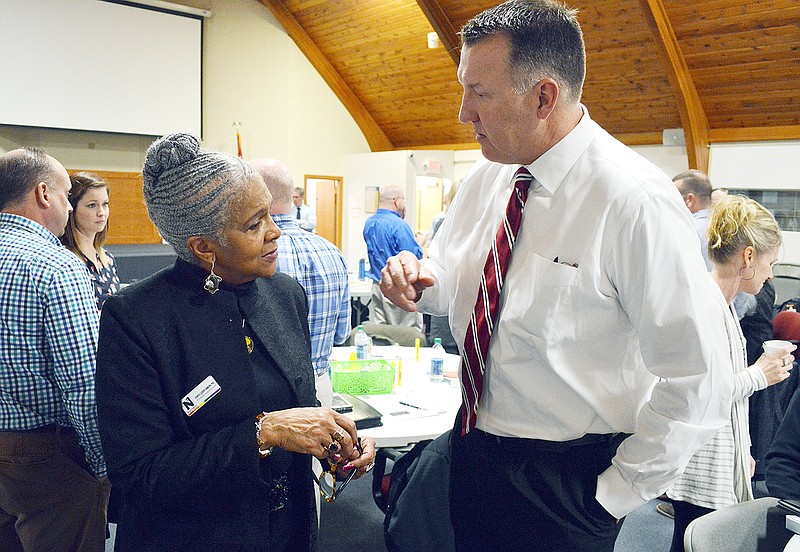Leaders of Jefferson City Public Schools and other community institutions on Wednesday participated in the first of three scheduled diversity training sessions led by Juanita Simmons, vice president of diversity, equity and inclusion at Northwest Missouri State University in Maryville.
The large meeting room at JCPS' Dix Road Education Center was full of district staff; building administrators; school board members Michael Couty, Lori Massman, Pam Murray and Lorelei Schwartz; Jefferson City Police Department school resource officers; and Jefferson City Parks, Recreation and Forestry Department staff.
The district and other local institutions got to be seated at discussion tables after months of community discussion and publicly expressed concerns about school-centered diversity, equity and inclusion issues.
The district announced last month that its three immediate goals were to continue to work on ensuring the district's hiring procedures lead to a more diverse staff, bring back the district's multi-cultural advisory committee and host the diversity training led by Simmons.
Simmons will return two more times this year, both during the summer, JCPS Director of Human Resources Shelby Scarbrough said.
"The goal is to start the conversation," Simmons said of her priorities for the first session that focused on microaggressions and implicit biases.
Microaggressions are targeted verbal, nonverbal and environmental actions people take - maybe subtly and maybe without intention - that slight, snub or insult other people because of their identity.
Implicit biases are the subconscious and often instantaneous assessments people make of others based on attitudes or stereotypes.
One central office staff member asked if it's possible for a middle-aged person to acknowledge a lifetime's worth of accumulated biases and move beyond them.
Simmons' answer somewhat redirected the question into why it's important to try.
"We can't curse them with the burden of all this mess," she said of students' well-being and healthy development being the ultimate goal - the "mess" being the effects of prior generations' actions and attitudes toward groups of people who have been dehumanized.
Simmons highlighted that there are more identities in a diverse world than race; there's more than just a black or white binary: ability, gender, language, sexual orientation, ethnicity, culture or nationality.
She encouraged those present to be more aware of bullying of students - especially transgender students, given their increasing public presence, and international students, based on xenophobia from an increased public presence of white nationalism.
She said today's young people are more diverse than previous generations, and they're looking for leadership from their elders.
"We have to make them hungry for justice," she said. She also highlighted the needs for today's youth to be more globally competitive, restorers and protectors of democracy, and human beings who value equity and civility.
Superintendent Larry Linthacum said of his preliminary takeaways from the first training session: "We have to set the course district-wide."
Linthacum added that principals will lead conversations on the building level with teachers, and the training sessions will provide direction for building officials to lead their staff.
Simmons said the second training session will use JCPS-specific data along with state and national statistics to look at issues including the school-to-prison pipeline - how school disciplinary policies and actions can disparately push students of color into the criminal justice system.

